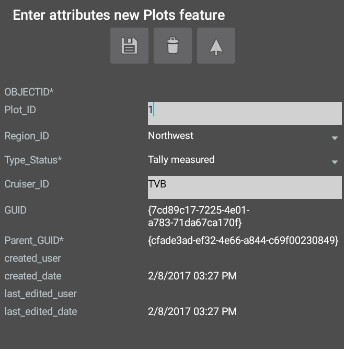Identify
The Identify Tool is used to display feature attributes in a read-only user interface and initiate search and navigation.
The query and collect toolbar includes (from left to right) an 'identify' button, a 'draw' button, a 'GPS collect' button, and an 'edit' button.
Draw
The “draw” button enables the user to manually delineate new features using a ‘heads-up digitizing’ approach. This method of data collection can be used if the user wishes to quickly define the geometry of a feature based on features they see in in the imagery, topo map, other layers, etc.
There are 2 different drawing modes, Tap and Trace. Tap mode requires a user to enter each vertex individually by tapping on the location for that vertex. Trace mode automatically adds vertices as a user traces a continuous line (for lines or polygons). The mode can be selected in Settings > Data Collection and Editing > Digitizing Method
Tap
This is the default setting in MobileMap. Tap mode requires a user to enter each vertex individually by tapping on the location for that vertex.
To draw a point, tap the screen at the desired location. To draw a
line or a polygon, tap once for each vertex in the line or polygon. Once the shape is complete, tap on the green check box in the upper left of the screen. To cancel a drawing, tap the red X icon in the upper left of the screen.
Trace
To draw a point, tap the screen at the desired location. To draw a
line or a polygon, drag your finger/stylus on the map to create the
desired outline of the shape (trace mode, default), or tap the map to
create individual vertices and double tap to add the final vertex (tap
mode).
GPS
The 'GPS' data collection button allows the user to collect data at the
location that the GPS is currently reporting. Tap the 'GPS
collect' button and select the desired layer for data collection, then
tap the screen anywhere on the map to begin collecting a feature. For
point features, a single tap will add a new point feature at your
current location. For polyline and polygon features, the first tap
(anywhere on the map) will add the first vertex of a new feature,
and subsequent taps will add additional vertices. Double tapping the map
will add the final vertex to complete the polyline or polygon feature.
Edit
The 'edit' button allows a user to select a feature that was previously
collected (or downloaded) and make edits. To begin, select the edit
icon, and then select the desired layer for data editing. Next, tap on
the feature on the map you wish to edit.* The edit attributes window
will open. Attributes may be edited in this window. To edit geometry,
select the pencil icon from within the Edit attributes window and then
draw an edit feature on the map. Prompts will then guide the user
through expanding, truncating, realigning, or replacing the edited
feature. Click the disk button to save the edits and close the window.
If you have trouble selecting an existing point feature for editing, make sure you are zoomed in close to the point on the map. If you are still having trouble, increase the Search Buffer in the settings (Settings > Search >
Search Buffer). If you have trouble selecting a point that is spatially close to another point, zoom the map in close to the point and set the Search Buffer to a small number such as 1 or 10 m.
Adding/Editing Attributes
Regardless of the method used to delineate a feature’s geometry, the attribute editor interface is the same. The attribute editor includes all of the attribute fields in the feature layers data model. Some fields (e.g. created user, GUID) are read only. Other fields (e.g., Plot_ID, Notes) are free text fields that are edited using the software keyboard. Other fields use dropdown lists to select a value from a list of allowed values. Still other functionality (such as photos or trees) are launched from buttons. Fields with asterisks (*) indicate required fields that must be populated before the record can be saved or closed.




